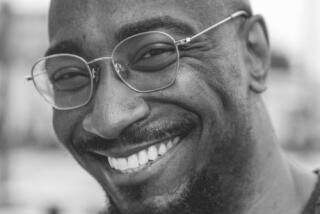Activists love and lose in the Cairo novel, ‘The City Always Wins’
“Cairo is jazz: All contrapuntal influences jostling for attention, occasionally brilliant solos standing high above the steady rhythm of the street.” Perhaps, but Cairo is also where Egyptian liberals recently found themselves lodged between the theocratic-minded Muslim Brotherhood and the power-hungry Egyptian military. In a way, it was their beloved Cairo (Umm al-Dunya, or “mother of the world” in Arabic) that disabused them of their peculiarly noble hubris. Consider the sobering title of Omar Robert Hamilton’s debut novel: “The City Always Wins.”
Hamilton’s story portrays the street turmoil that followed dictator Hosni Mubarak’s ouster in early 2011 and provides a peek into the minds of a group of left-liberal youth. Real-life Egyptian blogger and activist Alaa Abd El-Fattah, who has languished in jail since 2015 for organizing an illegal protest and assaulting a policeman, is Hamilton’s cousin, and Egyptian British writer Ahdaf Soueif is his mother.
As a documentary-like portrait, “The City Always Wins” is an intermittently revealing literary work by a fiercely engagé writer. But with underdeveloped and for the most part interchangeable characters, the book fails as imaginative fiction.
Khalil, an American of Palestinian Egyptian parentage who narrates the third and final sections of the book, and his girlfriend, Mariam, form the backbone of tiny, do-it-yourself online media outfit Chaos, which reports on abuses perpetrated by the security services and the military. They come close to qualifying as protagonists of this novel. Close, but not quite; Hamilton prefers to use their activism as a means to facilitate the telling of other people’s stories.
The people in question are victims of the notoriously repressive Egyptian police and the sometimes trigger-happy army (the novel opens with the latter gunning down over two dozen Coptic Christian protesters in Maspero). Mubarak is gone, but the fear is that remnants of his regime in these sectors will stymie Egypt’s transition to democracy. Part 1 relentlessly assaults the reader’s senses with a series of staccato vignettes depicting one outrage after another — including some, such as sexual harassment of women, committed by otherwise ordinary Egyptian men.
Forged in the crucible of a revolutionary movement that has now failed, their romance stands little chance of sustaining itself.
The book’s middle section coincides with the autocratic and Islamist turn of newly elected President Mohamed Morsi (a former high-ranking member of the Muslim Brotherhood), and maintains much the same approach. To his credit, however, Hamilton provides a glimpse into the relationship between the couple ostensibly at the story’s center. Mariam, who lives with Khalil despite not being married to him (a rarity in Egypt), takes her beau to meet her parents, who are understandably worried about their activism.
The two have no intention of easing up. With the army’s removal of the polarizing Morsi, Egypt segues from Islamization to militarization, and democracy advocates face a new adversary. Many people support the coup and its leader, a general named Abdel-Fattah El-Sisi. They aren’t dissuaded by the army’s massacre of hundreds of protesting Brotherhood members and supporters in Rabaa al-Adawiya. Hamilton deftly captures the mainstream Egyptian media’s complicity in whipping up a pro-military frenzy, as with the brouhaha over the army’s supposed invention of a cure for AIDS by means of a taser that, when fired, zaps it out of your system. (Too bad it doesn’t cure stupidity.) Following a controversial election in 2014, El-Sisi becomes president. “You have a peaceful revolution to topple a dictator,” Khalil fumes, “but to have a peaceful transition you need elections and the only people with the resources and networks to win the elections are ex-dictators and dictators-in-waiting.”
Part 3, in which all this takes place, proves the most personal in tone. Hamilton lays bare Khalil’s interiority through his rapid stream-of-consciousness narration. At one point, referring to the now-jailed Alaa Abd El-Fattah, Khalil laments, “Alaa, it was only yesterday that all of Cairo shook with your name and your face flew on banners from Oakland to Manila. Only yesterday that you marched into the military court to denounce it before the captivated audiences of the world.”
Yet even here politics comes to hold sway. As the new Egypt begins increasingly to recall the Mubarak era, many once-hopeful Egyptians experience their umpteenth year of roiling discontent. So consequential is this that it impinges on Khalil and Mariam’s relationship. Forged in the crucible of a revolutionary movement that has now failed, their romance stands little chance of sustaining itself. “We are nothing now but the reminder of our loss,” concludes a resigned, defeatist Khalil. To the disturbingly cynical Hamilton, politics is everything; love ignites and sputters out in time with the political realities of the day.
Al-Shawaf is a writer and book critic in Beirut.
Omar Robert Hamilton
MCD: 320 pages, $26.
More to Read
Sign up for our Book Club newsletter
Get the latest news, events and more from the Los Angeles Times Book Club, and help us get L.A. reading and talking.
You may occasionally receive promotional content from the Los Angeles Times.








